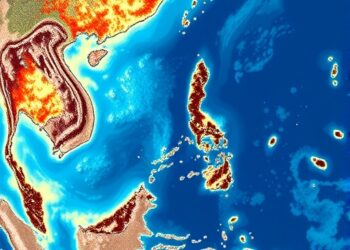A meta-analysis of Mediterranean Sea marine species reveals the profound impact of the Messinian Salinity Crisis – a drastic environmental event that resulted in the almost complete evaporation of the Mediterranean Sea roughly 5.5 million years ago. According to the new study’s findings, the event nearly reset the region’s biodiversity. The findings offer novel insights linking tectonic and palaeoceanographic changes to marine biodiversity, highlighting the significant role of salt giants in shaping biogeographic patterns, including those that still influence ecosystems today. The Messinian Salinity Crisis (MSC), occurring between 5.97 and 5.33 million years ago, was a significant environmental event that drastically altered the Mediterranean Sea. Triggered by tectonic activity that closed off the sea’s connection to the Atlantic, the isolation of the Mediterranean led to a repeated cycle of partial or nearly complete desiccation of the basin, resulting in extreme fluctuations in salinity, temperature, and eventually, the accumulation of roughly 1 million cubic kilometers of salt. For hundreds of thousands of years, the mostly dry abyssal plane, which lay 3 to 5 kilometers below sea level, was characterized by high temperatures and a few hypersaline lakes similar to the present-day Dead Sea. However, despite the magnitude of the MSC, its effects on Mediterranean biodiversity at the ecosystem level remain relatively unknown. Leveraging a recently compiled, comprehensive fossil record from the region, which encompassed diverse species from nannoplankton to marine animals, Konstantina Agiadi and colleagues quantified the biodiversity changes associated with the MSC. Agiadi et al. show that the MSC led to significant changes in the Mediterranean’s marine biodiversity, with 66.8% dissimilarity between the species before and after the crisis. Most changes were due to the introduction of new species following the MSC when the Mediterranean reestablished its connection to the Atlantic, rather than the survival of pre-MSC species. Notably, only 86 out of 2006 endemic species survived the event. Moreover, the authors show that the present-day northwest-to-southeast decreasing trend in species richness in the Mediterranean was established after the MSC.
A meta-analysis of Mediterranean Sea marine species reveals the profound impact of the Messinian Salinity Crisis – a drastic environmental event that resulted in the almost complete evaporation of the Mediterranean Sea roughly 5.5 million years ago. According to the new study’s findings, the event nearly reset the region’s biodiversity. The findings offer novel insights linking tectonic and palaeoceanographic changes to marine biodiversity, highlighting the significant role of salt giants in shaping biogeographic patterns, including those that still influence ecosystems today. The Messinian Salinity Crisis (MSC), occurring between 5.97 and 5.33 million years ago, was a significant environmental event that drastically altered the Mediterranean Sea. Triggered by tectonic activity that closed off the sea’s connection to the Atlantic, the isolation of the Mediterranean led to a repeated cycle of partial or nearly complete desiccation of the basin, resulting in extreme fluctuations in salinity, temperature, and eventually, the accumulation of roughly 1 million cubic kilometers of salt. For hundreds of thousands of years, the mostly dry abyssal plane, which lay 3 to 5 kilometers below sea level, was characterized by high temperatures and a few hypersaline lakes similar to the present-day Dead Sea. However, despite the magnitude of the MSC, its effects on Mediterranean biodiversity at the ecosystem level remain relatively unknown. Leveraging a recently compiled, comprehensive fossil record from the region, which encompassed diverse species from nannoplankton to marine animals, Konstantina Agiadi and colleagues quantified the biodiversity changes associated with the MSC. Agiadi et al. show that the MSC led to significant changes in the Mediterranean’s marine biodiversity, with 66.8% dissimilarity between the species before and after the crisis. Most changes were due to the introduction of new species following the MSC when the Mediterranean reestablished its connection to the Atlantic, rather than the survival of pre-MSC species. Notably, only 86 out of 2006 endemic species survived the event. Moreover, the authors show that the present-day northwest-to-southeast decreasing trend in species richness in the Mediterranean was established after the MSC.
Journal
Science
Article Title
The marine biodiversity impact of the Late Miocene Mediterranean salinity crisis
Article Publication Date
30-Aug-2024




